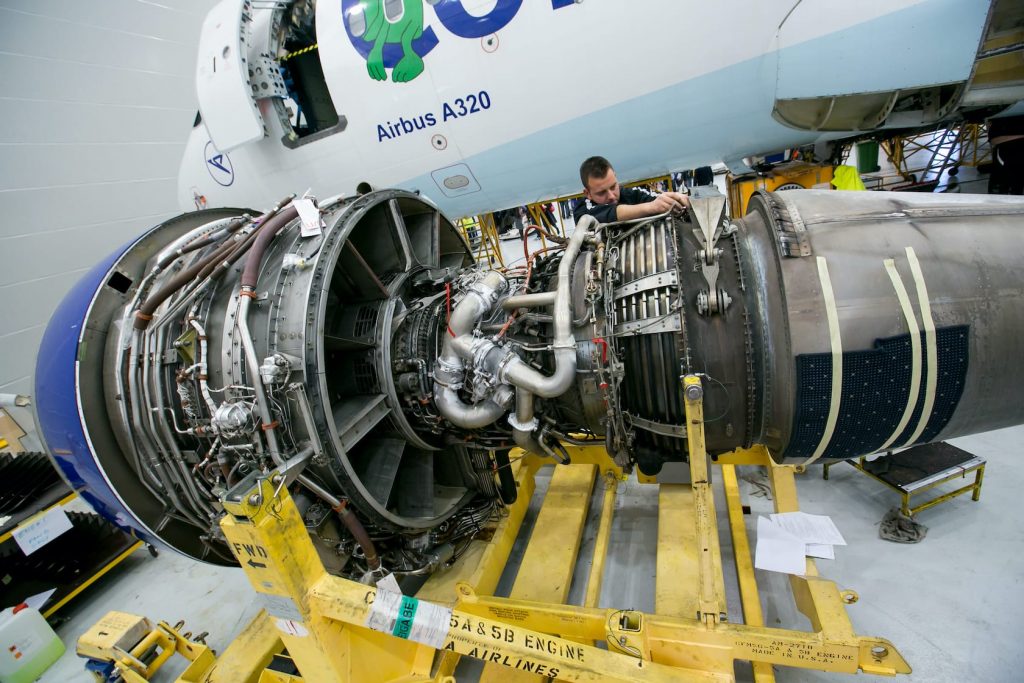The study programme in Aircraft Maintenance provides education in the field of organizing and implementing maintenance technologies for aircraft, aircraft systems, and equipment for civil and military aviation. Graduates who complete this study programme are trained to perform jobs in civil aviation, the police and the military in the field of aircraft maintenance.
About the study
Aircraft Maintenance is a study programme focused on education in the fields of maintenance organization and implementation of aircraft and aircraft systems maintenance technologies for both civil and military aviation. Students acquire knowledge in: the design and features of aircraft, electrical and mechanical systems and aircraft equipment, organization and technology of aircraft maintenance, aircraft systems and equipment, implementation of occupational safety measures, implementation of safety and quality systems in aircraft maintenance processes in accordance with aviation regulations and standards, working in multicultural environments and leading multicultural teams in aircraft maintenance operations.
Upon completion of the study, students acquire the necessary knowledge and skills to work in aircraft maintenance roles. Graduates are qualified to handle professional tasks related to managing the organization and execution of technological maintenance processes in accordance with aircraft airworthiness control standards.
Professional Competences include:
- Possession of knowledge in aerodynamics and in the manufacturing and maintenance technologies of aircraft structures, aircraft systems, and engines.
- Possession of knowledge in the field of remote data transmission using all types of signal modulation for the control and maintenance of aircraft navigation and communication systems.
- Development of aircraft maintenance programs in accordance with design requirements and aviation regulations.
- Planning of aircraft maintenance tasks according to the requirements of maintenance programs, aiming to minimize the impact on scheduled flights while maintaining safety and cost-efficiency.
- Based on data received from automatic onboard reporting systems, feedback from flight crews, or findings from inspections or tests during aircraft maintenance, analyzing the operational correctness and reliability of the aircraft, its systems, and engines.
- Planning necessary spare parts, materials, tools, and human resources for aircraft maintenance tasks.
- Organizing and managing institutions for the development of aircraft maintenance programs and for the maintenance of aircraft, parts, and engines.
- Applying principles of quality, safety, and cost-efficiency in planning tasks and in organizing and ensuring the quality of aircraft maintenance operations.
- Identifying causes of errors in the aircraft maintenance system caused by unintentional human actions and analyzing these errors to prevent future occurrences.
General Competences include:
- Organizing and leading multicultural teams for aircraft maintenance.
- Communication with partners in English and Croatian, either directly or via electronic media (e.g., analyzing the probability of events based on system monitoring and defined observation events; applying non-destructive testing methods to assess material quality and detect structural flaws).
- Adaptability – the ability to adjust to changing circumstances and new challenges in the field of aircraft maintenance (e.g., implementing new technologies and solutions into maintenance programs, drafting engineering orders, and preparing documentation for work and the existing maintenance organization system).
- Constructively and ethically resolving problems within the professional field of work – the ability to identify problems and find effective solutions in a dynamic environment (e.g., analyzing existing design and technological solutions on aircraft and recommending improvements to aircraft construction and maintenance technologies; identifying the causes of errors arising from human factors and proposing solutions to prevent them).
- Technological literacy – understanding and using modern technologies and software tools in aircraft maintenance (e.g., understanding and applying software and hardware solutions in aircraft design and maintenance technologies in line with technological development; using 3D printing technology to produce parts and tools for work).
- Use of IT technologies for monitoring aircraft systems, organizing work, and archiving data based on a paperless office model.
Learning outcomes of the study programme:
OZR1. Develop operational manuals based on the analysis of aviation regulations related to aircraft maintenance, airworthiness, and operational requirements for aircraft.
OZR2. Outline the structure of an air transport organization and an aircraft, engine, or component maintenance organization.
OZR3. Classify levels of maintenance according to their impact on safety and the costs of regular and non-regular maintenance.
OZR4. Apply the quality system concept within an air operator organization and an aircraft maintenance organization.
OZR5. Distinguish between aircraft maintenance based on the MSG-2 and MSG-3 concepts.
OZR6. Differentiate individual aircraft components in relation to the physical laws of flight and the functioning of aircraft systems.
OZR7. Apply standard aircraft maintenance procedures as prescribed by the aircraft maintenance program.
OZR8. Create a center-of-gravity shift diagram for an aircraft in accordance with the designed performance, operational flight limitations, and maintenance requirements, based on aircraft weighing data.
OZR9. Calculate the required minimum stock of spare parts and materials in the warehouse for aircraft maintenance.
OZR10. Solve problems in mechanics, thermodynamics, electrical engineering, aerodynamics, and fluid mechanics related to aircraft operations.
OZR11. Analyze operational flight errors using data from aircraft maintenance reliability programs.
OZR12. Differentiate responsibilities related to ensuring working conditions, execution of aircraft maintenance tasks, and the aircraft maintenance organizational process.
OZR13. Describe the professional and ethical responsibilities of the human factor in aircraft maintenance.
OZR14. Use English language with aviation vocabulary at a level sufficient for understanding aircraft technical documentation and applying procedures written in English.
OZR15. Present your views, solutions, and projects through seminar papers, project development, and the final thesis.
OZR16. Use information technology and digital methods for teaching and independent learning.
